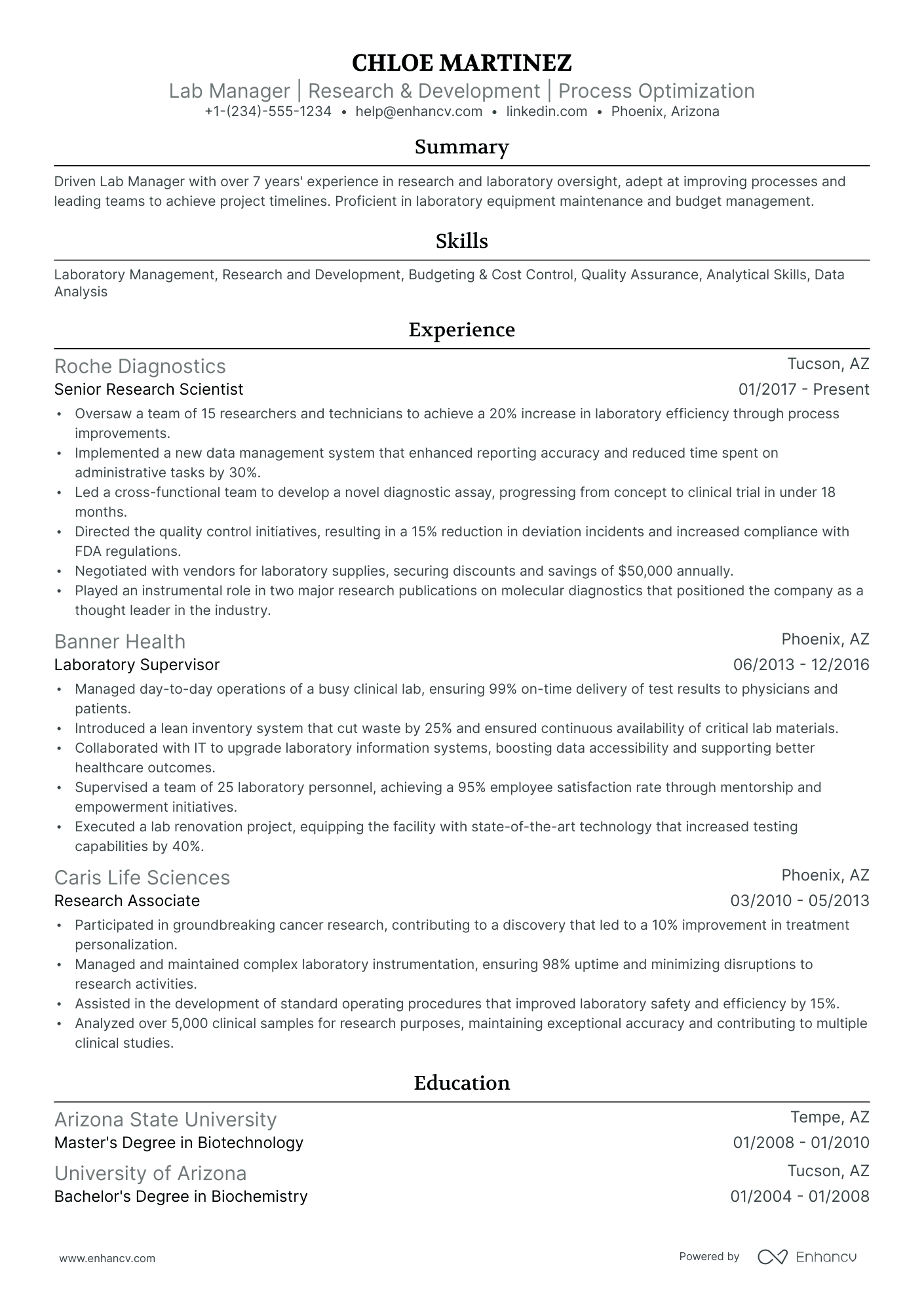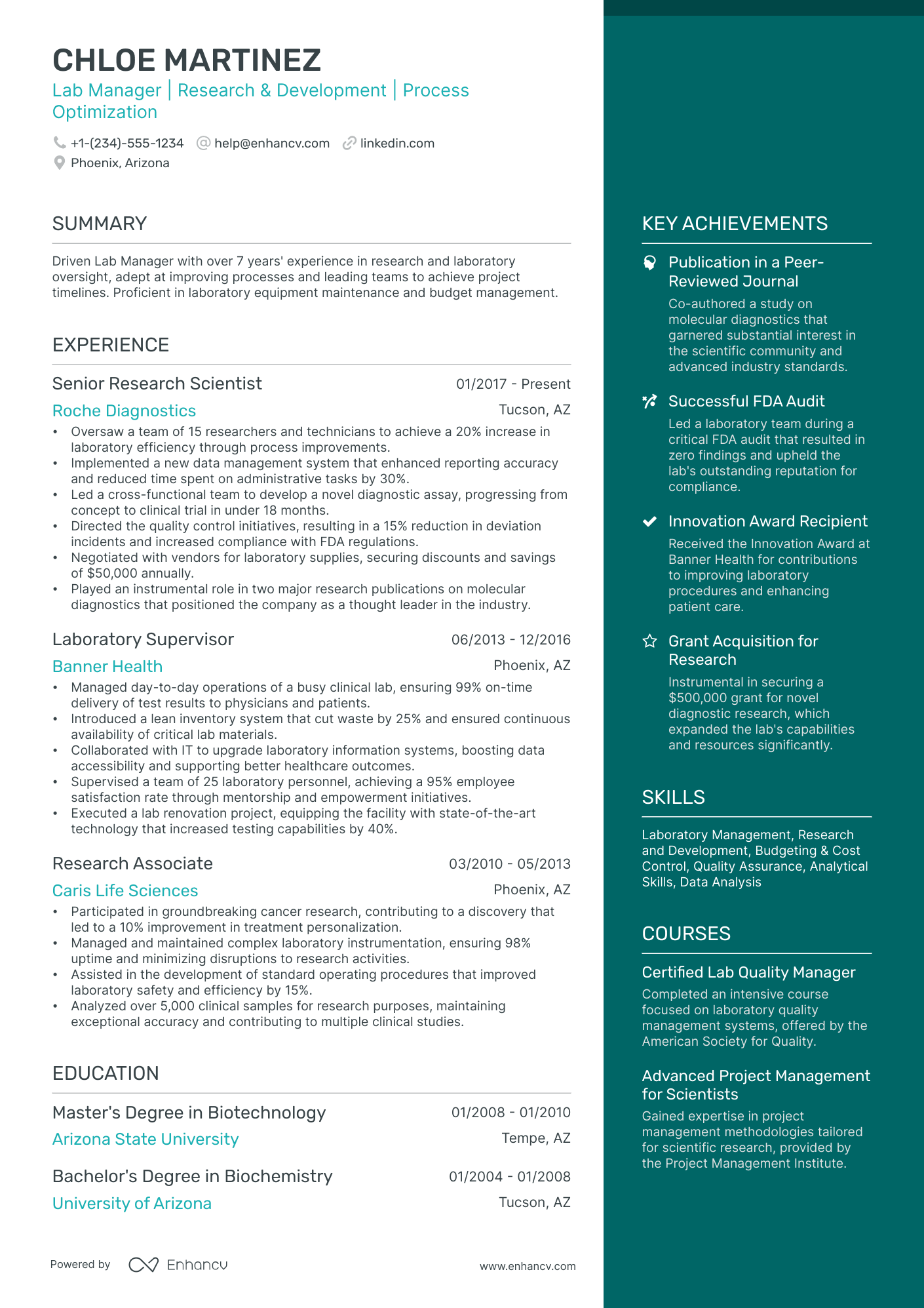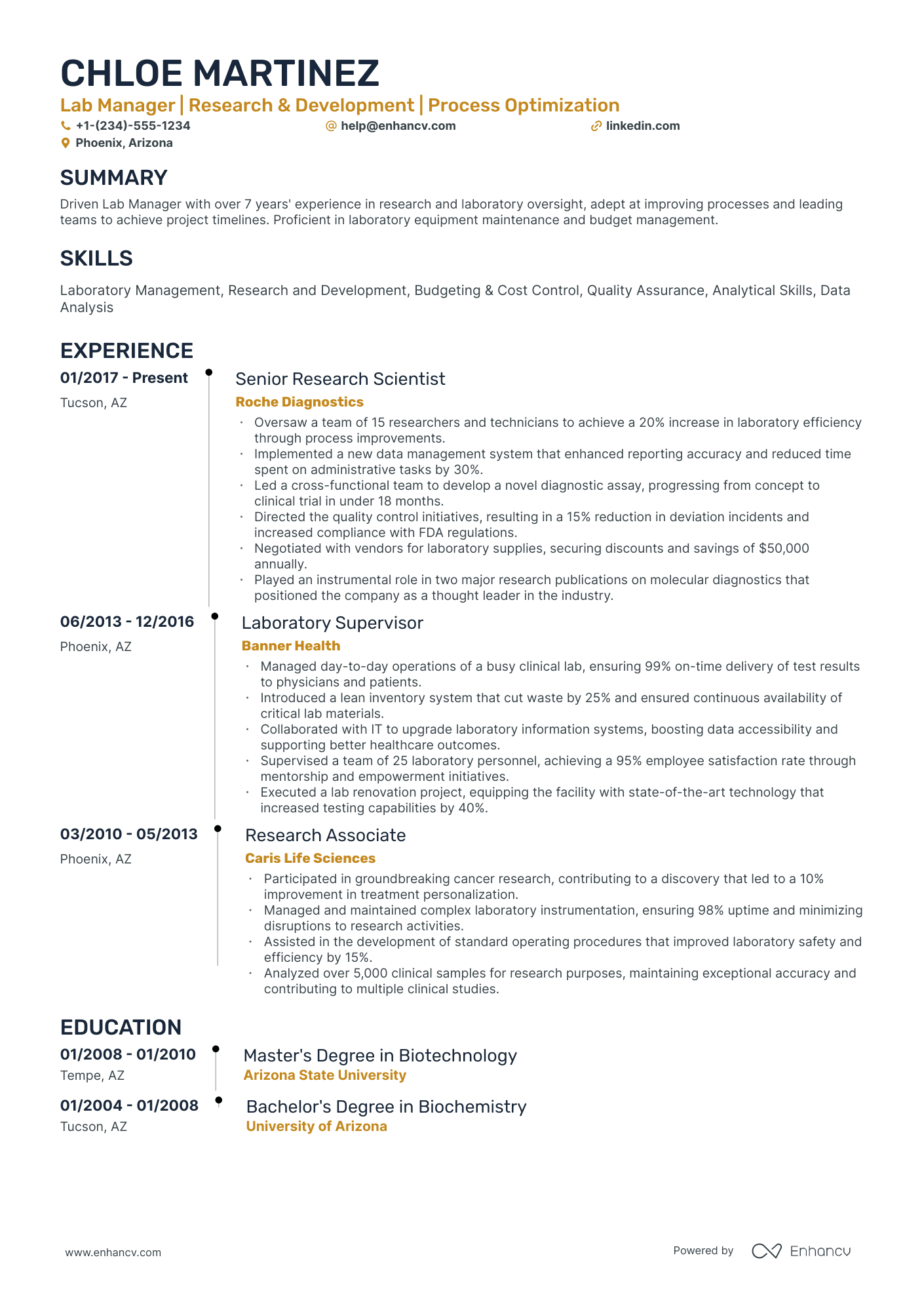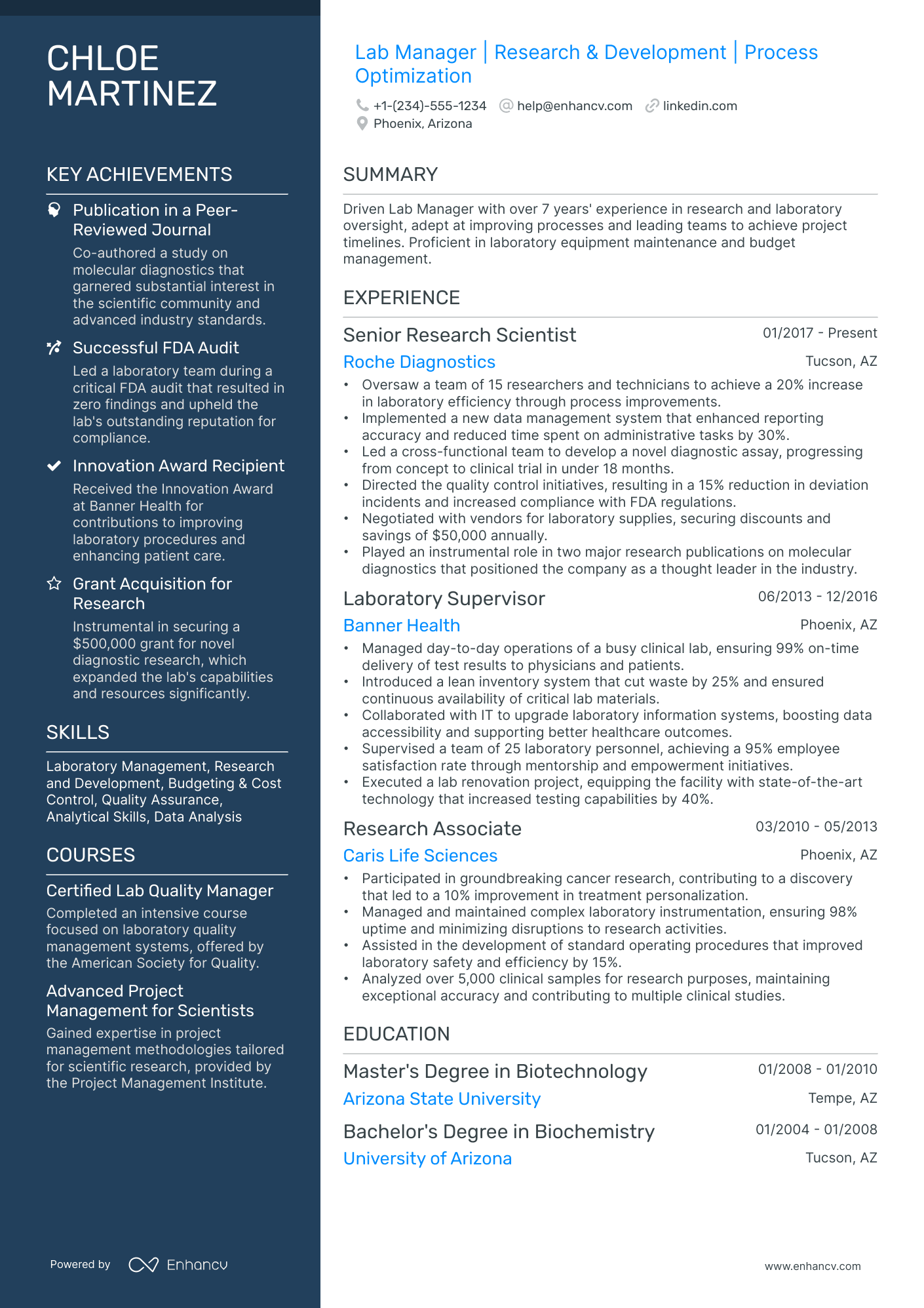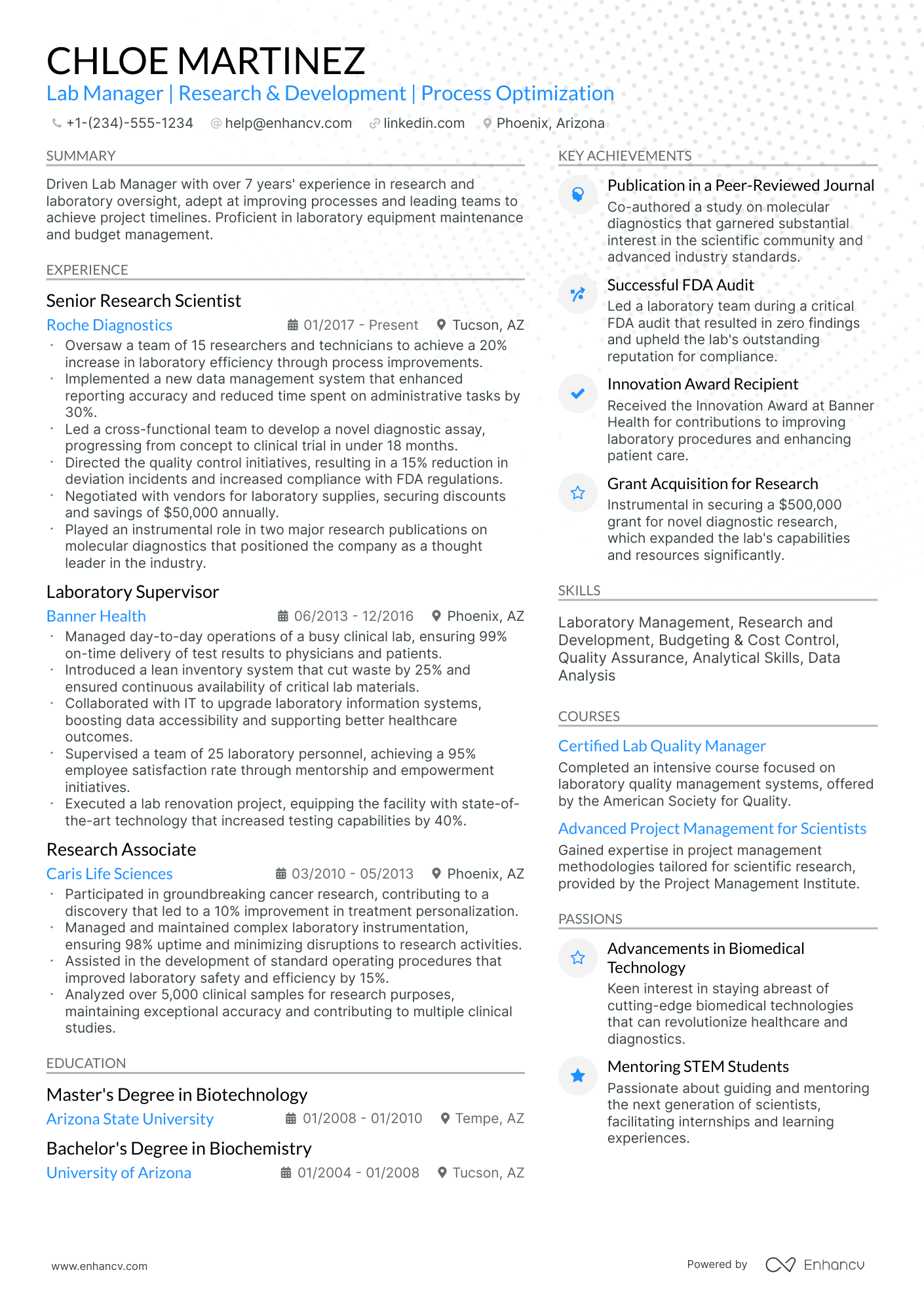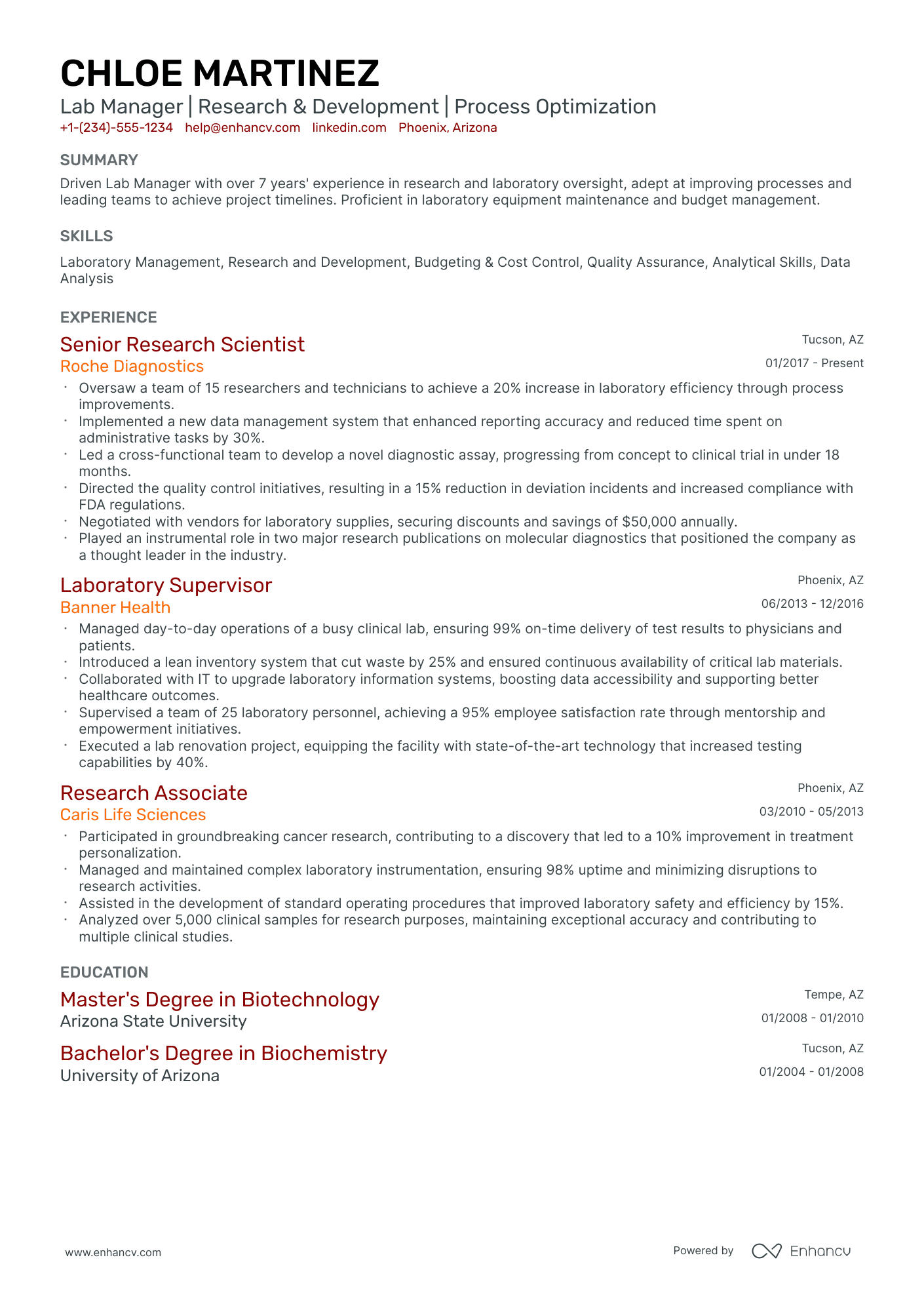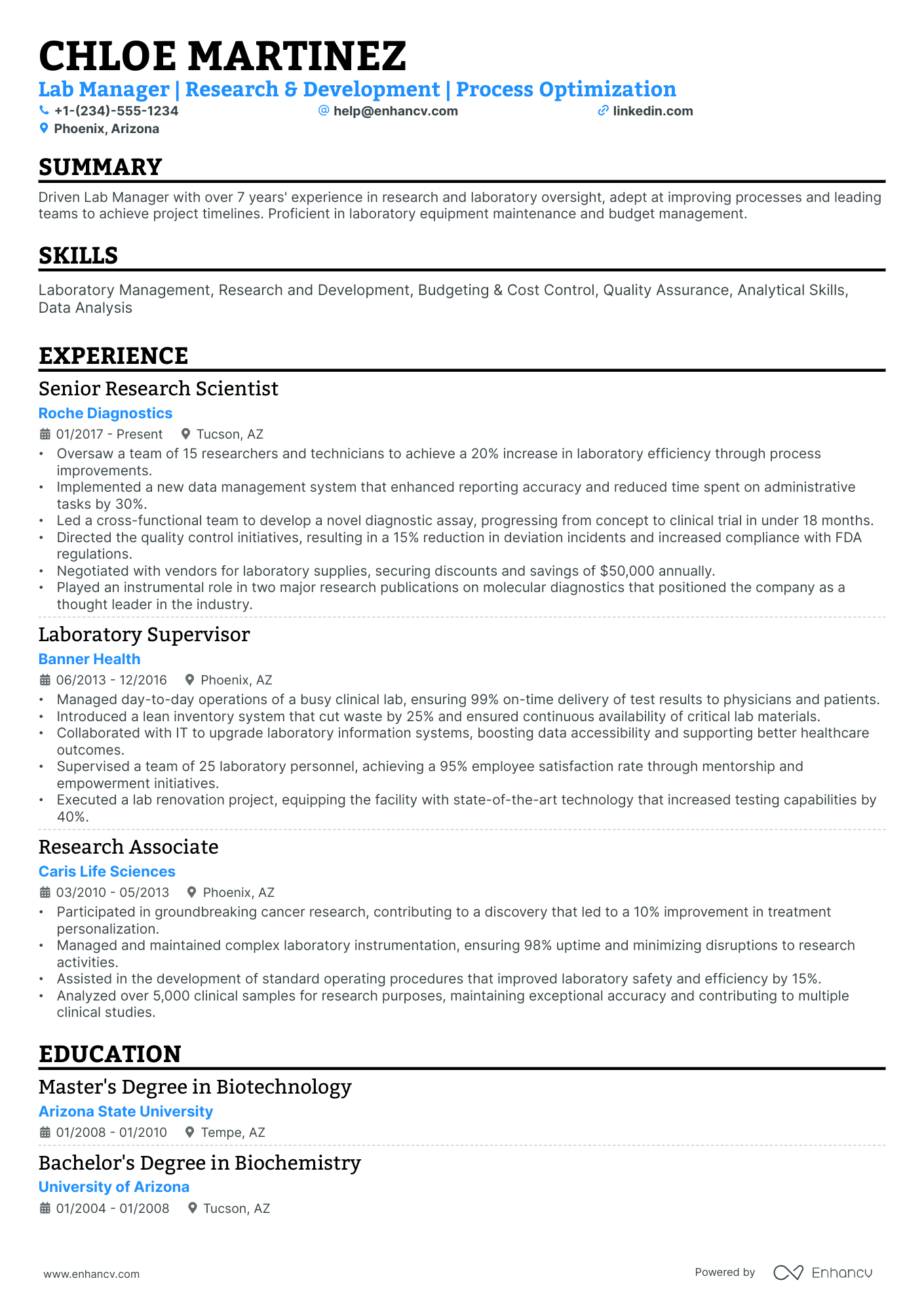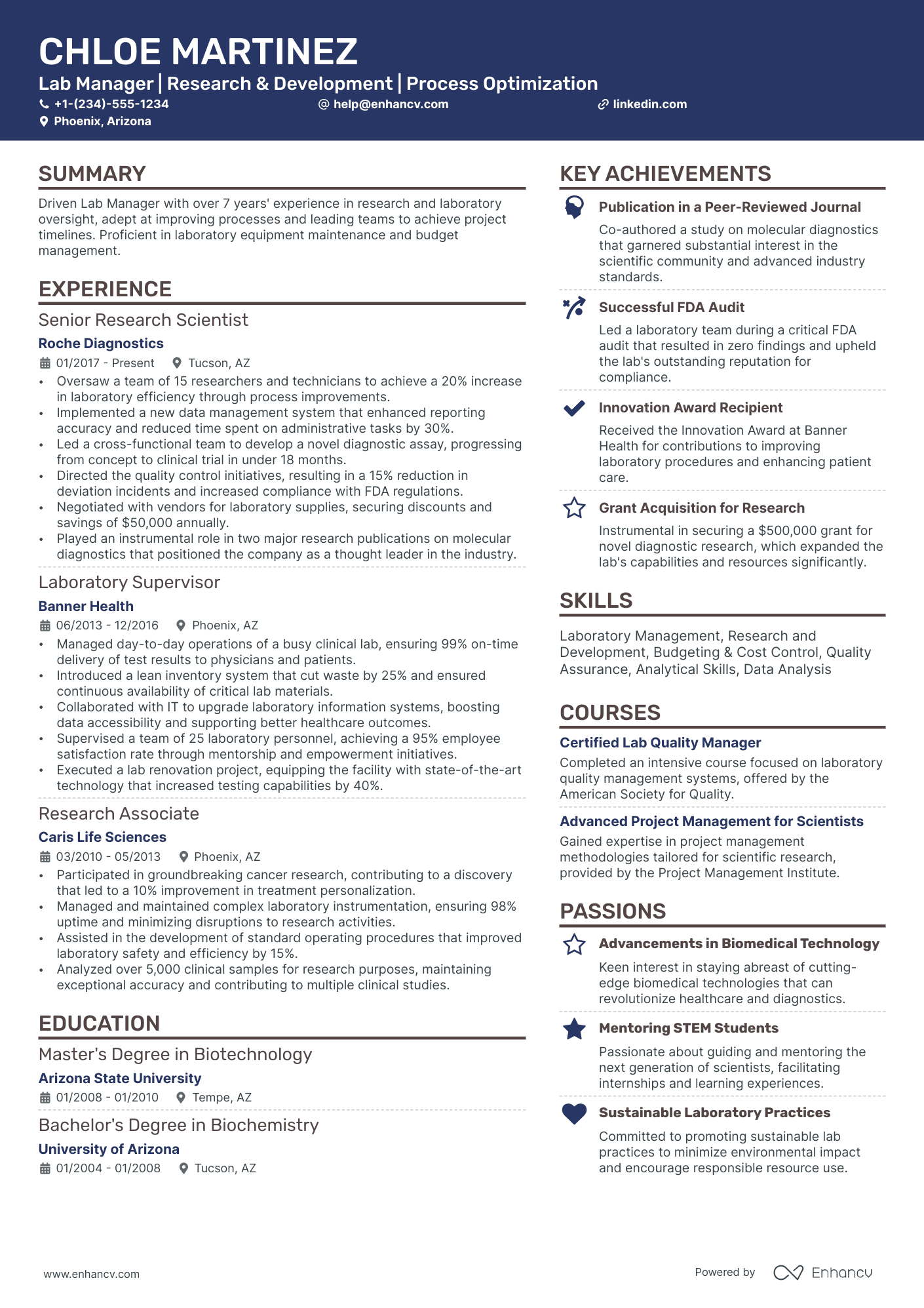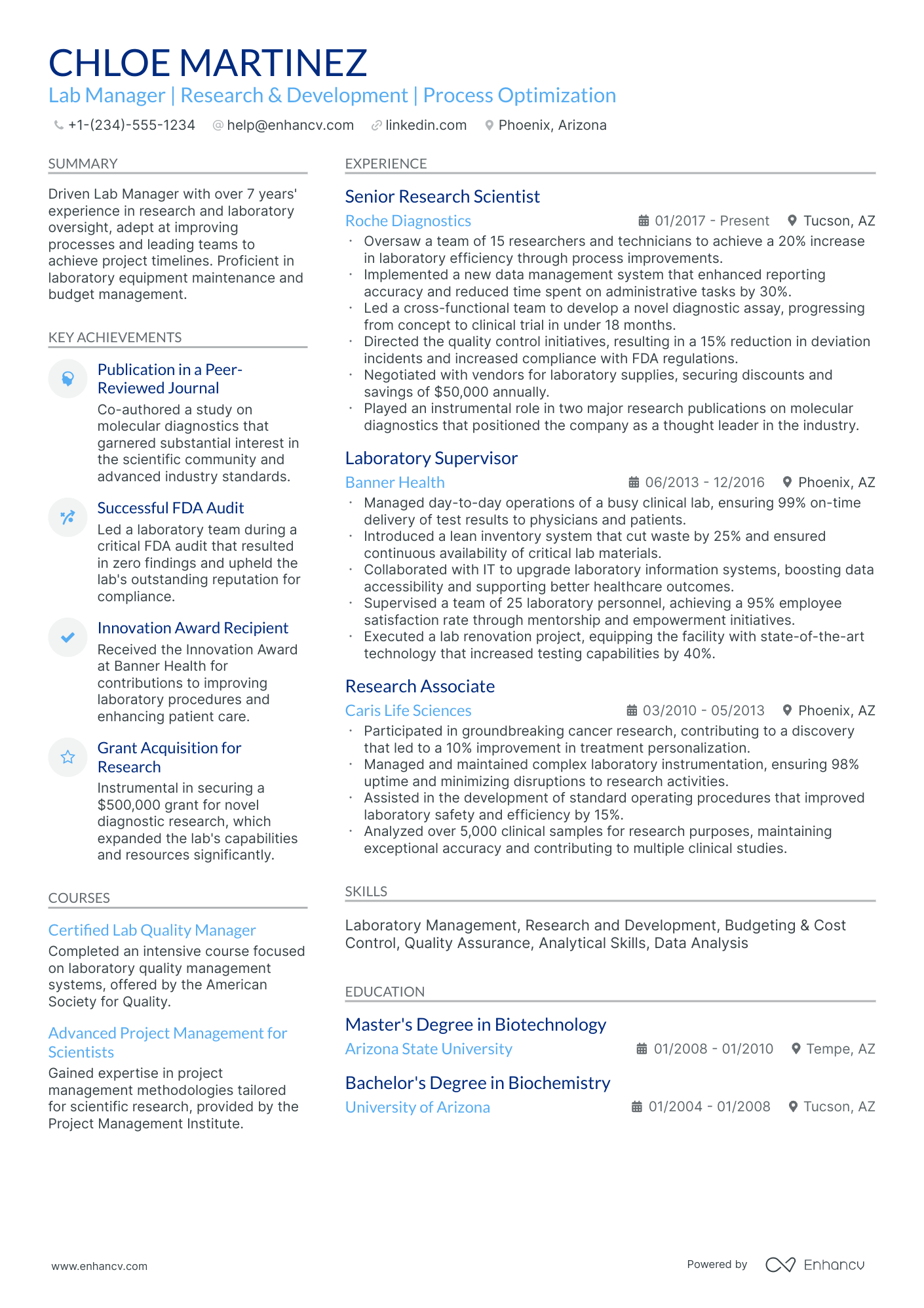As a lab manager, articulating your extensive experience in overseeing complex projects and laboratory operations in a clear and concise way can be a significant resume challenge. Our guide is designed to help you distill your multifaceted expertise into a compelling narrative that highlights your leadership skills and technical know-how, making your resume stand out to prospective employers.
- Sample industry-leading examples to learn how to write your best resume yet.
- Improve the experience, education, and achievements section of your resume with insights from resume-writing professionals.
- Curate your technical expertise and personality to stand out amongst the pool of candidates.
- Succinctly focus on your unique skill set all through your lab manager resume.
If the lab manager resume isn't the right one for you, take a look at other related guides we have:
- Researcher Resume Example
- Chemist Resume Example
- Research Associate Resume Example
- Research Manager Resume Example
- Research Assistant Resume Example
- Research Director Resume Example
- Scientist Resume Example
- Radiologic Technologist Resume Example
- Lab Assistant Resume Example
- Lab Technician Resume Example
Lab manager resume format made simple
You don't need to go over the top when it comes to creativity in your lab manager resume format .
What recruiters care about more is the legibility of your lab manager resume, alongside the relevancy of your application to the role.
That's why we're presenting you with four simple steps that could help your professional presentation check all the right boxes:
- The reverse-chronological resume format is the one for you, if you happen to have plenty of relevant (and recent) professional experience you'd like to showcase. This format follows a pretty succinct logic and puts the focus on your experience.
- Keep your header simple with your contact details; a headline that details the role you're applying for or your current job; and a link to your portfolio.
- Ensure your resume reaches an up-to-two-page limit, only if you happen to be applying for a more senior role or you have over a decade of relevant experience.
- Save your lab manager resume as a PDF to retain its structure and presentation.
Consider your target market – resumes in Canada, for example, follow different layout conventions.
Upload & Check Your Resume
Drop your resume here or choose a file. PDF & DOCX only. Max 2MB file size.
PRO TIP
Bold the names of educational institutions and certifying bodies for emphasis.
Essential sections that should make up your lab manager resume include:
- The header - with your contact details (e.g. email and telephone number), link to your portfolio, and headline
- The summary (or objective) - to spotlight the peaks of your professional career, so far
- The experience section - with up to six bullets per role to detail specific outcomes
- The skills list - to provide a healthy mix between your personal and professional talents
- The education and certification - showing your most relevant degrees and certificates to the lab manager role
What recruiters want to see on your resume:
- Experience with Laboratory Information Management Systems (LIMS) and inventory management
- Proven track record of managing laboratory operations and ensuring compliance with safety and quality regulations
- Strong leadership skills and experience with supervising and training laboratory personnel
- Expertise in budgeting, financial management, and purchasing for laboratory supplies and equipment
- Demonstrated ability to develop and implement standard operating procedures (SOPs) and best practices within a lab setting
Creating your lab manager resume experience to catch recruiters' attention
Remember that for the lab manager role, hiring managers are looking to see how your expertise aligns with their requirements. Here's where your resume experience section can help out. Make sure you:
- Include mainly roles that are relevant to the lab manager job you're applying for;
- Don't go too far back in your experience - recruiters will only care what you did a decade ago if it's really important for the lab manager role;
- Each bullet you include should say what you did, followed by the skills you used and the actual end result of your efforts;
- Quantify each of your achievements with numbers and possibly the overall effect it had on the organization;
- Highlight transferrable skills - or personal skills you've attained thanks to past jobs - that could be applicable within your potential workplace. This would showcase your unique value as a professional.
Formatting the experience section of your resume doesn't have to be an over-the-top deep dive into your whole career. Follow the lab manager resume examples below to see how industry-leading professionals are presenting their experience:
- Oversaw the expansion and upgrading of laboratory facilities, improving the throughput capacity by 70% by introducing automated systems.
- Enhanced lab safety protocols and conducted regular training sessions, significantly reducing workplace accidents by 40% over a 2-year period.
- Led a cross-functional team of 25 scientists in developing a new quality assurance framework, cutting down test result turnaround time by 30%.
- Implemented a cloud-based lab information management system (LIMS), streamlining data management and supporting a 25% increase in research productivity.
- Negotiated with suppliers to acquire state-of-the-art lab equipment, staying within budget limits and enhancing research capabilities.
- Managed the coordination and timely submission of 5 major research projects, securing continued funding from grant agencies.
- Designed and implemented a new lab inventory tracking system, reducing supply waste by 20% and ensuring optimal stock levels.
- Played a pivotal role in the lab's certification process, attaining ISO 15189 accreditation for medical laboratories.
- Co-authored three peer-reviewed articles based on collaborative research efforts, enhancing the lab's industry reputation.
- Established a training program for lab staff in advanced analytical techniques, which improved team skills and project versatility.
- Championed the integration of continuous improvement practices, resulting in a 15% reduction in reagent costs through optimized procedures.
- Built strong partnerships with key industry players to facilitate knowledge sharing and spearheaded two collaborative research initiatives.
- Initiated the adoption of Lean Management principles in lab settings, increasing operational efficiency by 25%.
- Managed the transition of assay methods from R&D to full-scale production, ensuring consistency and quality across batches.
- Fostered a culture of continuous learning, leading to the development of patent-pending technology in sample processing.
- Collaborated with IT to develop custom lab management software, enhancing tracking of experiments and research outcomes.
- Leveraged expertise in biotechnology to oversee the launch of a new diagnostic test, contributing to a 20% increase in lab service offerings.
- Guided the lab through a digital transformation, automating data collection and reducing manual entry errors by 35%.
- Coordinated the laboratory's participation in international research consortia, securing funding and fostering global partnerships.
- Managed a multidisciplinary research team, leading to the publication of 10 papers in high-impact journals over a 5-year period.
- Spearheaded the initiative for energy-efficient laboratory practices, reducing overall energy consumption by 15% without compromising research activities.
- Initiated a comprehensive cross-training program, enhancing team flexibility and reducing reliance on single points of failure.
- Orchestrated the overhaul of laboratory information systems leading to a 50% improvement in data retrieval time.
- Directed the scale-up of a proprietary testing protocol, transitioning from pilot to high-volume processing and achieving a 150% increase in service capacity.
- Authored a comprehensive laboratory safety manual adopted by the entire organization, setting a new standard for safe practices.
- Optimized procurement processes, managing annual budgets exceeding $2 million and achieving a 10% cost reduction through strategic supplier partnerships.
- Instituted an intern and externship program, which contributed to a pool of highly skilled graduates effectively filling open positions.
- Streamlined the migration to a new high-throughput screening platform, raising the number of assays performed by 100%.
- Enhanced staff development through a mentorship program, increasing employee retention rates by 30% within the laboratory department.
- Led collaborative efforts with clinical teams to refine diagnostic tools, which improved patient outcomes through faster diagnosis and targeted treatments.
Quantifying impact on your resume
- Include the number of laboratory staff you have managed to demonstrate your leadership and organizational capabilities.
- Specify the budget size you have effectively managed to highlight your financial responsibility and resource allocation skills.
- List the percentage reduction in waste or costs your initiatives have achieved to showcase your efficiency and cost-saving abilities.
- Detail the number of research projects supervised, indicating your experience in overseeing complex scientific work.
- Mention the increase in publication or grant success rates under your management to reflect your ability to drive research excellence.
- Quantify the improvements in laboratory safety records to emphasize your commitment to maintaining a secure working environment.
- State the number of new processes or systems you implemented to illustrate innovation and continuous improvement.
- Describe the extent of cross-departmental collaborations you facilitated to show your teamwork and interdisciplinary skills.
Action verbs for your lab manager resume
Remember these four tips when writing your lab manager resume with no experience
You've done the work - auditing the job requirements for keywords and have a pretty good idea of the skill set the ideal candidate must possess.
Yet, your professional experience amounts to a summer internship .
Even if you have limited or no professional expertise that matches the role you're applying for, you can use the resume experience section to:
- List extracurricular activities that are relevant to the job requirements. Let's say you were editor-in-chief of your college newspaper or part of the engineering society. Both activities have taught you invaluable, transferrable skills (e.g. communication or leadership) that can be crucial for the job;
- Substitute jobs with volunteer experience. Participating in charity projects has probably helped you develop an array of soft skills (e.g. meeting deadlines and interpersonal communications). On the other hand, volunteering shows potential employers more about you: who you are and what are the causes you care about;
- Align job applications with your projects. Even your final-year thesis work could be seen as relevant experience, if it's in the same industry as the job you're applying for. Ensure you've listed the key skills your project has taught you, alongside tangible outcomes or your project success;
- Shift the focus to your transferrable skills. We've said it before, but recruiters will assess your profile upon both job requirements and the skills you possess. Consider what your current experience - both academic and life - has taught you and how you've been able to develop your talents.
Recommended reads:
PRO TIP
If you failed to obtain one of the certificates, as listed in the requirements, but decide to include it on your resume, make sure to include a note somewhere that you have the "relevant training, but are planning to re-take the exams". Support this statement with the actual date you're planning to be re-examined. Always be honest on your resume.
Popular lab manager hard skills and soft skills for your resume
Apart from assessing your professional expertise, recruiters are on the lookout for whether your skills align with the job.
Your profile would thus be assessed in regard to your:
- Hard or technical skills - your ability to perform on the job using particular technologies or software
- Soft skills - how you adapt, communicate, and thrive in different environments.
Both types of skills - hard and soft skills - are important for your resume, so make sure to create a dedicated skills section that:
- Lists up to five or six skills that align with the job advert.
- Integrates vital keywords for the industry, but also reflects on your personal strengths.
- Builds up further your skills with an achievements section within which you explain what you've achieved thanks to using the particular skill.
- Aims to always quantify in some way how you've used the skill, as it's not enough to just list it.
What are the most sought out hard and soft skills for lab manager roles?
Check out the industry's top choices with our two dedicated lists below:
Top skills for your lab manager resume:
Laboratory Information Management System (LIMS)
Microscopy Techniques
Spectroscopy
Chromatography
PCR (Polymerase Chain Reaction)
Data Analysis Software (e.g., MATLAB, R)
Quality Control and Quality Assurance
Chemical Safety Regulations
Inventory Management Systems
Equipment Calibration and Maintenance
Leadership
Communication
Problem-Solving
Time Management
Attention to Detail
Team Collaboration
Adaptability
Critical Thinking
Conflict Resolution
Project Management
PRO TIP
If you happen to have plenty of certificates, select the ones that are most applicable and sought-after across the industry. Organize them by relevance to the role you're applying for.
Maximizing your lab manager resume: education and certification sections
To effectively showcase your industry knowledge in your lab manager resume, it's important to properly list your education and certifications.
For the education section, ensure you include:
- Higher education degrees pertinent to the industry or those at a postgraduate level;
- The start and end dates of your education, along with the name of the institution you graduated from;
- Your GPA and relevant coursework, but only if they are impressive and applicable to the role.
Additionally, create a separate certifications section to spotlight your most notable recognitions. Another excellent place to feature a leading industry certificate is in your resume header, right after your name.
Below is a list of key industry certifications that are often sought after by recruiters
The top 5 certifications for your lab manager resume:
- Certified Laboratory Manager (CLM) - Association of Clinical Scientists (ACS)
- Certified Professional in Healthcare Quality (CPHQ) - National Association for Healthcare Quality (NAHQ)
- Medical Laboratory Scientist (MLS) - American Society for Clinical Pathology (ASCP)
- Certified Clinical Research Professional (CCRP) - Society of Clinical Research Associates (SOCRA)
- Project Management Professional (PMP) - Project Management Institute (PMI)
PRO TIP
Showcase any ongoing or recent educational efforts to stay updated in your field.
Recommended reads:
Choosing between a lab manager resume summary or objective
Many may argue that, in recent times, the lab manager resume summary or objective has become completely obsolete.
But the reality is different as both of these resume sections provide you with an opportunity to :
- integrate lab manager-vital keywords
- showcase your accomplishments
- answer why you're applying for this particular role.
The difference (between the summary and the objective) is that the:
- Resume objective puts your career goals in a more prominent position.
- Resume summary focuses more on career milestones.
We recommend you select the summary if you happen to have plenty of experience you'd like to spotlight from the very start of your lab manager resume.
Meanwhile, the objective is ideal for those candidates who'd like to further prove their suitability for the role with their goals and soft skills.
We've featured some industry professional lab manager resume samples to the best resume summary and objective structures:
Resume summaries for a lab manager job
- With over a decade of meticulous management in high-volume analytical chemistry laboratories, a seasoned professional brings unparalleled expertise in GLP compliance, sample integrity, and cross-functional team leadership, demonstrating a record of reducing operational expenses by 15% through innovative workflow optimization strategies.
- Dedicated microbiologist with 8 years of experience transitioning to laboratory management, leveraging a strong background in pathogen research and biocontainment procedures to ensure exemplary safety standards and improve data analytics processes for infectious disease testing at a leading biotech research facility.
- As a former clinical research coordinator with 5 years of experience, adeptly shifting career focus to laboratory management with the intent to apply robust project management skills and a detailed understanding of clinical trial protocols to enhance the efficiency of laboratory operations in a dynamic healthcare setting.
- Eager to translate a 7-year tenure in aerospace materials testing into laboratory management, bringing a unique perspective on systems engineering and quality assurance protocols to enhance the reliability and accuracy of material analysis in a fast-paced research laboratory.
- As a recent graduate with a Master's degree in Laboratory Management and a zeal for scientific innovation, I am poised to contribute fresh methodologies in streamlining lab operations and fostering a culture of continual improvement in a cutting-edge research environment.
- Having just obtained a Bachelor's in Laboratory Science, I am keen on marrying my academic knowledge with practical application in a laboratory management setting where I can learn from seasoned professionals and contribute to the advancement of research techniques and standards.
Taking your lab manager resume to the next level with these four additional resume sections
Your lab manager resume can feature a variety of skills (both hard and soft) in diverse sections. Choose those that align best with the job requirements and reflect your suitability for the company culture.
Consider these four additional resume sections recommended by our experts:
- Languages - State any languages you are proficient in and your level of proficiency. This demonstrates your commitment to communication and potential for international growth.
- Projects - Highlight up to three significant projects you've completed outside of work, showcasing skill development. Include a link to your project portfolio in the lab manager resume header, if applicable.
- My Time - How you allocate your time outside work can indicate your organizational skills and cultural fit within the company.
- Volunteering - Detail causes you're passionate about, roles you've held, and achievements in volunteering. Such experiences likely have honed a range of soft skills crucial for your dream job.
Key takeaways
- The layout of your resume should take into consideration your professional background while integrating vital sections and design elements;
- Highlight your most pertinent achievements for the role all through different sections;
- Be very specific when selecting your certifications, hard skills, and soft skills to showcase the best of your talents;
- Include within the top one-third of your lab manager resume a header and summary to help recruiters understand your experience and allocate your contact details. A skills box is optional, but it will help you align your expertise with the role;
- Detail the full extent of your professional experience with specific bullets that focus on tasks, actions, and outcomes.
